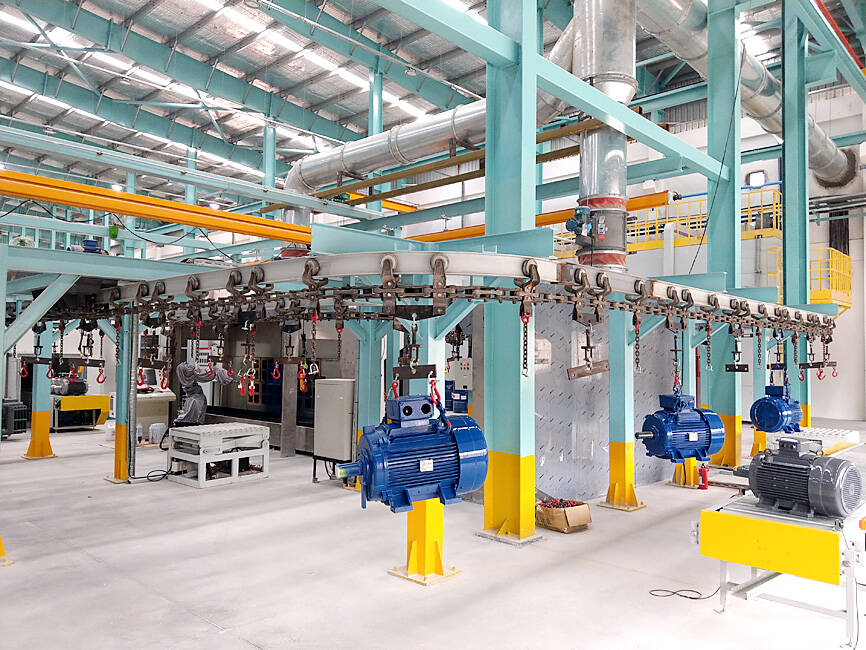TEMICO Motor India Pvt Ltd has obtained powertrain orders from major Indian electric vehicle (EV) manufacturers, its parent company Teco Electric & Machinery Co (東元電機) said in a statement yesterday.
TEMICO is to supply 5,000 9m and 12m electric bus direct-drive powertrains and 50,000 light commercial vehicle powertrains, as part of its three-year contract, the statement said.
Delivery of the powertrains is expected to begin in the first quarter of next year, it said.

Photo courtesy of Teco Electric & Machinery Co
Financial terms of the deal were not disclosed.
TEMICO is a joint venture established by Teco and Japan’s Mitsui & Co in 2020 to supply high-efficiency industrial motors and powertrain systems for EVs in India. Located in Bengaluru in southern India, TEMICO began trial runs of its production line for EV powertrains at the end of November last year.
It is expected to start mass production after gaining certification from the Bureau of Indian Standards next month, the firm said.
“This large order for EV powertrains marks an important breakthrough for Teco in the Indian market,” Teco chairman Morris Li (利明献) said.
Li was elected, unopposed, as Teco chairman during a board meeting on May 31, succeeding Sophia Chiu (邱純枝). Chiu was promoted to vice chairwoman of Teco Group (東元集團).
Following the rapid growth of the Indian EV market and to cope with Indian Prime Minister Narendra Modi’s “Make in India” policy, Teco aims to expand local operations and increase market share in the South Asian nation, Li said.
After starting the mass production of EV powertrains later year, TEMICO expects to become the second company in India that can produce electric bus powertrains locally, as there is only one such manufacturer currently, George Lien (連昭志), a board director of TEMICO, said in the statement.
Teco has focused heavily on manufacturing powertrains for electric buses at its home market, but the scale of the Indian market is more attractive to the company, Lien said.
The Indian electric bus market is expected to expand significantly, as Modi’s government plans to replace 800,000 diesel-powered buses across the nation with electric buses by 2030, and New Delhi has launched preferential policies to increase efficiency and achieve decarbonization in public transportation systems, he said.
TEMICO has continued to talk with other bus manufacturers in India, as it strives to become an important electric bus powertrain supplier, Lien said.
The company has a positive outlook regarding its EV powertrain and charging pile business in India, China and North America, as those markets have shown signs of a stable demand, he added.

Nvidia Corp chief executive officer Jensen Huang (黃仁勳) on Monday introduced the company’s latest supercomputer platform, featuring six new chips made by Taiwan Semiconductor Manufacturing Co (TSMC, 台積電), saying that it is now “in full production.” “If Vera Rubin is going to be in time for this year, it must be in production by now, and so, today I can tell you that Vera Rubin is in full production,” Huang said during his keynote speech at CES in Las Vegas. The rollout of six concurrent chips for Vera Rubin — the company’s next-generation artificial intelligence (AI) computing platform — marks a strategic

REVENUE PERFORMANCE: Cloud and network products, and electronic components saw strong increases, while smart consumer electronics and computing products fell Hon Hai Precision Industry Co (鴻海精密) yesterday posted 26.51 percent quarterly growth in revenue for last quarter to NT$2.6 trillion (US$82.44 billion), the strongest on record for the period and above expectations, but the company forecast a slight revenue dip this quarter due to seasonal factors. On an annual basis, revenue last quarter grew 22.07 percent, the company said. Analysts on average estimated about NT$2.4 trillion increase. Hon Hai, which assembles servers for Nvidia Corp and iPhones for Apple Inc, is expanding its capacity in the US, adding artificial intelligence (AI) server production in Wisconsin and Texas, where it operates established campuses. This

Garment maker Makalot Industrial Co (聚陽) yesterday reported lower-than-expected fourth-quarter revenue of NT$7.93 billion (US$251.44 million), down 9.48 percent from NT$8.76 billion a year earlier. On a quarterly basis, revenue fell 10.83 percent from NT$8.89 billion, company data showed. The figure was also lower than market expectations of NT$8.05 billion, according to data compiled by Yuanta Securities Investment and Consulting Co (元大投顧), which had projected NT$8.22 billion. Makalot’s revenue this quarter would likely increase by a mid-teens percentage as the industry is entering its high season, Yuanta said. Overall, Makalot’s revenue last year totaled NT$34.43 billion, down 3.08 percent from its record NT$35.52

PRECEDENTED TIMES: In news that surely does not shock, AI and tech exports drove a banner for exports last year as Taiwan’s economic growth experienced a flood tide Taiwan’s exports delivered a blockbuster finish to last year with last month’s shipments rising at the second-highest pace on record as demand for artificial intelligence (AI) hardware and advanced computing remained strong, the Ministry of Finance said yesterday. Exports surged 43.4 percent from a year earlier to US$62.48 billion last month, extending growth to 26 consecutive months. Imports climbed 14.9 percent to US$43.04 billion, the second-highest monthly level historically, resulting in a trade surplus of US$19.43 billion — more than double that of the year before. Department of Statistics Director-General Beatrice Tsai (蔡美娜) described the performance as “surprisingly outstanding,” forecasting export growth